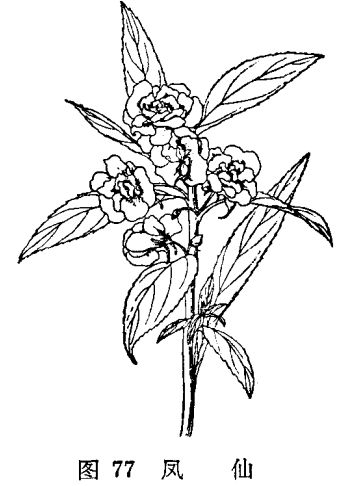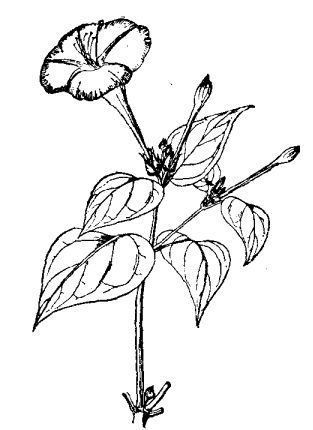Which three kinds of flowers belong to the same genus as impatiens?
1. Bafu Impatiens (LbalfouriHook.): perennial herb, 90 cm tall, much branched. The leaf margin has small curved teeth and the petiole is glandular. The flowers are large, with 6-8 clusters forming racemes. Capsule erect, 2.5-4 cm long, smooth. Native to the western Himalayas.
2. He Shi Impatiens (j.holstiiEngler&Warb.): perennial herb, plant height 60 cm. Leaves alternate subovate, upper leaves whorled, ovate-lanceolate. Flowers large, 4.5 cm in diameter, brick-red, solitary, or 2-fascicled. Native to eastern tropical Africa. Potted plants for greenhouse. There are dwarfs.
3. Sudan Impatiens (J.su.ttaniiHook.i.): similar to the former species, but the leaves are narrower, the flowers are smaller, the diameter is 2.5ml / 3.5cm, bright red, there are purple, pink and white varieties, and the growth is slower than the previous species. Originally from Tanzania. Potted plants for greenhouse.

What are the varieties of impatiens and the classification of impatiens varieties
Impatiens is very popular because it has bright colors and is easy to maintain. The juice of impatiens can be painted with nails, and many girls like to grow them at home. As an ornamental flower, impatiens is not only beautiful in shape, but also has many varieties. People can cultivate it according to the different growth characteristics of different varieties. So, what are the varieties of impatiens? Today we are going to learn about the classification of impatiens.
1. The head impatiens are also known as the head impatiens. Is a variety of impatiens. Flowers terminal. Main stem or branch apical. Large flowers, double. Branches expand and form clumps.
two。 Dwarf impatiens is a variety of impatiens. The plant is short, with a height of 20-30 cm.
3. Dragon claw impatiens is a variety of impatiens. The lateral branches meander and extend horizontally.
4. Ho's impatiens are also known as Glass Cui. It is a common species of the same genus. Perennial herbs, mostly cultivated in 2012. The plant height is 20-30 cm. The stem is translucent. Fleshy, stout, much branched. Leaves ovate-lanceolate, leaf tip pointed, leaf margin obviously serrated. Flowers solitary. Apical branch or upper leaf axil. There are many flowers, obviously sawtooth, flowers from white to pink, rose red, to crimson, as well as lilac, orange and other colors, the color is very bright and beautiful. The florescence is very long, up to 45-60 days. Like tide wet soil and shade environment, avoid low temperature, but also avoid hot sun exposure, can not bear high temperature. It is suitable for greenhouse cultivation. It is the one with the most potted plants and the highest ornamental value among the wind fairy flowers a few days ago.
5. New Guinea Impatiens is a common species of the same genus. Perennial herbs. Stem fleshy, stout, much branched and dilated, stem dark red. Upper leaves whorled, lower leaves opposite, leaves ovate-lanceolate, dark green or copper-green, midvein obvious, midvein and petiole red. There are many varieties of deep red flowers, including white, peach, rose, orange and crimson. Can not bear the high temperature, avoid the hot sun exposure. It has attracted attention and is gradually being used in green spaces and potted plants.
What are the varieties of impatiens? the classification of the varieties of impatiens is simply summarized here. Different varieties of impatiens have different growth characteristics, but all like loose, fertile, deep, well-drained soil. Impatiens avoid stagnant water, prolonged dampness and poor ventilation. When the temperature rises sharply in late spring and early summer and does not rain for a long time, we should pay attention to the reasonable arrangement of drainage and watering, and properly water it in the morning.
Is Impatiens poisonous? the function and efficacy of Impatiens
Impatiens, mainly from China and India, are butterfly-shaped, colorful and variable, so we can often see flowers of different colors on one flower. So is impatiens poisonous? what is the function and effect of impatiens?
Is impatiens poisonous?
There is a small poison, juice on the skin may cause itching, redness and swelling and other allergic reactions, do not play excessively.
The function and effect of Impatiens
(1) functional indications
Dispelling wind, promoting blood circulation, reducing swelling and relieving pain. Treatment of rheumatism, waist pain, women with amenorrhea and abdominal pain, postpartum blood stasis, fall injury, carbuncle, furuncle, goose palm wind, gray fingernails.
"Southern Yunnan Materia Medica": "treat infantile purulent ear."
"Compendium": "promoting blood circulation and eliminating accumulation. Treat snake wounds, waist pain."
"Materia Medica seeks the original": "treatment is partial to neglect."
Tianbao Materia Medica: "to treat nosebleeds."
Xizang commonly used Chinese herbal medicine: "dredging menstruation, promoting blood circulation, diuresis. Treatment of amenorrhea abdominal pain, postpartum blood stasis, stillbirth, adverse urination, toxic carbuncle gangrene."
Activating blood circulation and dredging meridian: this taste is sweet, slightly bitter, sexual temperature, entering the liver meridian, sweet and warm Tongli, and smooth qi and blood to give birth to new, its bitter can release and guide to dredge meridians, often used in the treatment of women with amenorrhea, abdominal pain, postpartum blood stasis and other syndrome. "Materia Medica Huiyan" contains impatiens: "the medicine for activating blood qi and promoting muscles and veins." Therefore, it can be treated as a result of mental stimulation, or changes in the living environment, resulting in stagnation of liver qi, loss of qi and blood, blood stasis and amenorrhea, dysmenorrhea for several months, abdominal distension, pain or refusal to press, chest tightness, hypochondriac pain, sexual irritability, purple tongue or petechiae. Or postpartum blood stasis caused by postpartum blood stasis, uterine contraction obstruction caused by postpartum abdominal pain, abdominal pain despite the pain, lochia less and not smooth, dark color block. Dark red tongue, purple tongue and other postpartum blood stasis syndrome, this abdominal pain is caused by blood stasis, obstruction of meridians, pain. This product can promote blood circulation and remove blood stasis, warm the meridians, blood stasis will stop the pain, and has the function of promoting blood circulation without injuring the right. The syndrome of blood stasis in women can be applied.
Dispelling wind and relieving pain: this product has the effect of dispelling wind evil and relieving pain and swelling. The Compendium of Materia Medica carries Fengxianhua; "promoting blood circulation and eliminating accumulation." Treat snake injuries and waist and rib pain. " , "Materia Medica seeks the original" carrying impatiens "to treat partial waste". The main treatment is due to deficiency of vital qi, emptiness of veins, wind evil to attack, induce phlegm and dampness, flow through meridians, cause qi and blood stagnation, or qi and blood deficiency, or hemiplegia and numbness due to blood stasis and collaterals blocking collaterals caused by loss of blood, or due to injury caused by falls, liver pain, swelling of blood stasis and so on. The liver is the viscera of storing blood, its meridian is on both sides, and the disease of blood stasis is mostly treated from the liver. When this product enters the liver, it can not only promote blood circulation and dredge menstruation, but also remove wind, relieve pain and detumescence, so for hemiplegia caused by blood stasis, or blood stasis edema and chest pain caused by falling injury, it can make the blood disperse, swelling and disappear, the meridians are unobstructed, and the disease can be cured.
(2) Pharmacological action
Effect on Trichophyton: it is proved that the flower juice of impatiens has inhibitory effect on Trichophyton rubrum, Trichophyton violaceus, Trichophyton groin and Trichophyton Golf.
Inhibitory effect on bacteria: this decoction also has different inhibitory effects on Staphylococcus aureus, Streptococcus haemolyticus, Pseudomonas aeruginosa, Salmonella typhi and Shigella dysenteriae.
Other: modern use of this product on the inhibition of Trichophyton fungi, often external use to treat goose palm wind, gray fingernails. Fresh use works best.
Differential application: balsamina balsamina and impatiens, both belong to Impatiens balsamina, one is flower, the other is seed, but its efficacy is different. balsamine mainly promotes blood circulation to relieve pain, treats blood stasis, while impatience breaks blood, soft and firm accumulation, mainly for accumulation, choking diaphragm, external choice, swelling and other syndromes. And impatiens are non-toxic, while impatience is poisonous. Clinical symptoms should be carefully identified.
(3) other functions:
Dye one's nails
In ancient Chaoshan and folk all over the country, it was popular to dye nails with impatiens. In the summer night, the girls pulled out the whole plant of impatiens, washed it, and pounded it into a paste with a little alum. Apply it to your fingernails before going to bed, wrap them with hemp leaves, wrap the string tightly, and dye your nails red overnight.
Today, manicure is still very fashionable, there are many professional manicure shops in urban and rural areas, but they all use chemical dyes, the cost is very high. Growing henna, no pollution, no money, and environmental protection, is still the first choice for rural girls.
Ornamental function
It originated from China and India. Widely cultivated in gardens all over China, it is a common ornamental flower. The flower shape of impatiens is strange, with a head and a tail, wings and feet, vivid and vivid, just like a flying Phoenix. Impatiens does not have a strong fragrance, but it is proud of its charming appearance.
Beautify the home
Impatiens can maintain excellent indoor air humidity, bright colors also add a lot of spring flavor to the home, at the same time, beautiful impatiens have great appreciation value, in the small house will appear infinite spring, as if living in the sea of flowers, decorated in the big house, can put out a noble home style.
- Prev

Cultivation and planting of Mirabilis jasminoides
[Alias] Rouge Flower, Night Rice Flower, Tide Flower, Grass Jasmine, Night Jiaojiao, Official Pink Flower, Number One Red, Bath Flower. [Family] Mirabilis family, Mirabilis genus. Perennial herbs, often cultivated annually. Height 50--80 cm. In Shanghai, roots can sometimes overwinter in the open field and germinate again in the following year.
- Next

Cultivation and planting methods of flax
Flavaceae, flax genus. Annual herbs, 40-50 cm tall, branched from base, erect. The stem is smooth. Leaves alternate, strip to strip-lanceolate, tip-pointed, grayish green. Flowers solitary, 2.0cm to 4cm in diameter, rose-red, with 5 petals. Pedicel slender
Related
- Fuxing push coffee new agricultural production and marketing class: lack of small-scale processing plants
- Jujube rice field leisure farm deep ploughing Yilan for five years to create a space for organic food and play
- Nongyu Farm-A trial of organic papaya for brave women with advanced technology
- Four points for attention in the prevention and control of diseases and insect pests of edible fungi
- How to add nutrient solution to Edible Fungi
- Is there any good way to control edible fungus mites?
- Open Inoculation Technology of Edible Fungi
- Is there any clever way to use fertilizer for edible fungus in winter?
- What agents are used to kill the pathogens of edible fungi in the mushroom shed?
- Rapid drying of Edible Fungi

